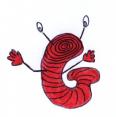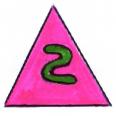Ces questions sont introduites par un mot interrogatif en wh- ou par how.

Les questions avec mot interrogatif au temps présent | |
| Article précédent ou suivant Commentez  cette page cette page |
Les questions avec mot interrogatif au temps présent

QUESTIONS AVEC ...
To be | Autre |
Mot interrogatif + to be conjugué + sujet (+complément) | Mot interrogatif + Aux + sujet + verbe (+complément) |
WHAT Qu'est-ce que ... Qu'est-ce qui ... | Qu'est-ce qui est bleu ? What is blue ? Qu'est-ce qu'il y a dans la voiture ? What is in the car ? Qu'est-ce qui se passe ? What's the matter ? | Qu'est-ce que tu manges ? What do you eat ? |
WHAT Quel, Quelle, ... | Quel est ton travail ? What's your job ? Quelle couleur est-ce ? What color is it ? |
WHEN Quand ... | Quand est le cours d'anglais ? When is the english course ? | Quand peut venir GU20 ? When can GU20 come ? |
WHERE Où ... | Où est GU20 ? Where is GU20 ? | Où vas-tu ce soir ? When are you going tonight ? (présent progressif) Où habites-tu ? Where do you live ? (présent simple) |
WHY Pourquoi ... | Pourquoi es-tu ici ? Why are you here ? | Pourquoi doit-il aller à la maison ? Why must he go home ? Pourquoi pleures-tu ? Why do you cry ? |
WHO Qui ... | Qui est GU20 ? Who is GU20 ? | Qui travaille maintenant ? Who is working now ? Qui travaille à Londres ? Who works in London ? |
HOW Comment ... | Comment est (va) ton ami ? How is your friend ? | Comment le sais-tu ? How do you know that ? |
WHOSE + Nom A qui ... | A qui est ce chien ? Whoses dog is it ? A qui sont ces ciseaux ? Whose scissors are they ? |
WHICH + of + Nom Lequel ... | Lequel de ces garçons est Peter ? Which of these boys is Peter ? |
HOW MUCH + Nom Sing Indénombrable Combien ... | Combien d'essence a la voiture ? How much petrol is in the car ? | Combien d'argent as-tu ? How much money have you got ? Combien (cela coûte-t-il) ? How much ? Combien coûte cet ordinateur ? How much is this computer ? |
HOW MANY + Nom plur dénombrable Combien ... | Combien y a-t-il de jours dans une semaine ? How many days are in a week ? Combien sont-ils ? How many are they ? Combien d'élèves sont dans la classe ? How many pupils are in the classroom ? Combien de frères as-tu ? How many brothers have you got ? | Combien de chats a-t-il ? How many cats has he got ? |
« who » peut également être un pronom relatif qui remplace un humain
I see a woman who is a teacher.
Je vois une femme qui est un professeur.
«which » peut également être un pronom relatif qui remplace une chose.
I see the fridge which is in the kitchen.
Je vois le frigidaire qui est dans la cuisine.

« What's on » est utilisé quand on veut demander le programme existant à la télé ou au cinéma
What's on T.V. tonight ?
There's a football match on BBC 2.
How
« How » accompagné sert à poser des questions sur :
|
L'âge |
How old ? |
How old are you ? |
Quel âge as-tu ? |
|
La vitesse |
How fast ? |
How fast is the plane ? |
Quelle est la vitesse de l'avion ? |
|
La taille |
How tall ? |
How tall is he ? |
Combien mesure-t-il ? |
|
La durée |
How long ? |
How long are your holidays ? |
Combien de temps durent vos vacances ? |
|
La distance |
How far ? |
How far is the station ? |
A quelle distance se trouve la gare ? |
|
L'altitude |
How high ? |
How high is the Mont Blanc ? |
Quelle est l'altitude du Mont Blanc ? |
|
La quantité |
How many ? How much ? |
How many pupils are in the classroom ? How much petrol is in the garage ? |
Combien d'élèves sont dans la classe ? Combien d'essence y a-t-il dans le garage ? |
|
Le prix |
How much ? |
How much is that computer ? |
Combien coûte cet ordinateur ? |
|
La fréquence |
How often ? |
How often do you cook ? I sometimes cook |
Tu cuisines tous les combien ? Je cuisine parfois |
|
La manière |
How well ? |
How well can you ski ? I can ski very well I can ski well I can ski a little I can ski not at all |
Quel est ton niveau de ski ? Très bon bon un peu pas du tout |
|
Cet article fait partie de la rubrique
Grammaire. Article précédent : Les "yes or no" questions au temps présent Article suivant : Question tags Ajouter cet article à mes favoris. Je souhaite commenter  cette page. cette page. |
Haut de page Page d'accueil Mentions légales Plan du Site |